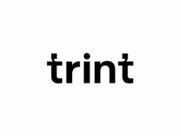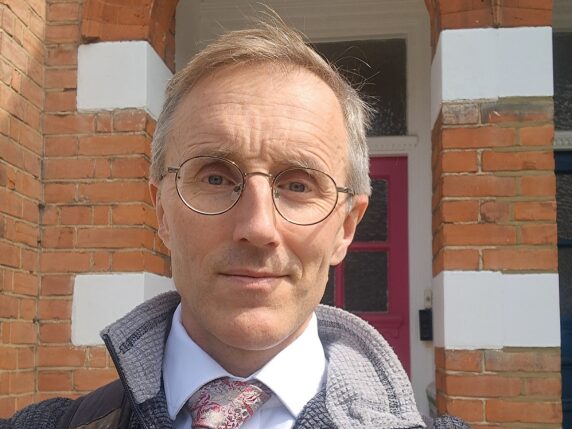Our popular Meet the client series reveals the inside story on the companies we support with legal services. This time, we speak to Emmy Award-winning war correspondent-turned-founder Jeff Kofman. The entrepreneur tells us how living through the pain point of manual transcription for thirty years sparked him to set up leading speech-to-text platform, Trint, and shares the story of their scale-up.
Name and job title
Jeff Kofman, CEO and Founder, Trint
What is it your company does?
Trint makes it easy for content creators to tell stories using audio and video files. Trint’s AI speech-to-text software makes any audio and video searchable, editable and shareable, in 31 languages. You can put a conversation into Trint and you’ll get a machine-generated transcript in no time. The transcript is searchable: for example, if we recorded a 30-minute interview and you wanted to find every time I said the word ‘Moscow’, all you have to do is run the file through Trint and search for ‘Moscow’. Previously, you’d have to listen to all 30 minutes to find the moments that matter. Because we tie the source audio to the text, you just need to click on the word ‘Moscow’ to listen to the audio. And if there's a mistake in the transcription, you can find it and correct it within seconds. We liberate users to focus on content production.
Who do you work with?
A lot of the major players in journalism in the US, UK, Canada, France and Germany use Trint. We’re also active in the corporate sector where you see a huge amount of content creation and brand journalism. The reason we have clients like the BBC, The New York Times, The Washington Post and Wells Fargo Bank is because we solve a problem, and because we save time and money. Trint allows professionals to focus on using their skillset instead of getting caught up in menial work. We've moved from that text economy of the 20th century to the voice economy of the 21st century. Text became searchable, shareable, discoverable through products like Microsoft Word. We need similar products for the spoken word. There’s a firehose of content coming at every one of us every day. And so much of it is not searchable because it's spoken. That's where Trint fits in. That means the use cases go way beyond journalism. Anybody with words, anybody with a laptop or a mobile phone is potentially a client.
How long have you been in business and how has your business grown?
We started out as a team of four in December 2014, six years ago. We've grown organically since then. Right now, we’re going through a period of rapid growth. We've recently received major funding from The New York Times and are doing well during these coronavirus times and economic uncertainty. That’s because we're a product that enables remote working and facilitates content production. There were 50 of us on 1 March when the pandemic really began. Today, we're 80 and we expect to be 100 by January.
What inspired you to start your business?
I had no plans to go into tech and no business or financial experience. I spent 30 years as a broadcast journalist in Canada and the US as a war correspondent and foreign correspondent, reporting from more than 40 countries. In that time, I must’ve transcribed thousands of hours of interviews, speeches, news conferences, news reports, radio reports, documentaries and features. It was always one of the pain points in the workflow. Then I met a team of talented engineers at a conference about six years ago. I asked them, ’Why do I have to manually transcribe my own interviews in the 21st century when automated tools are out there?’ The problem was the automated tools didn’t give you perfect results. I couldn’t have any mistakes, because I was a reporter. And inaccuracies would be the end of my career as they would be for a lawyer, or academic, or anyone in any job with responsibility. That’s how Trint was born: from my own pain point as a reporter.
It turns out that I actually fit into a fairly classic entrepreneur's profile, which is a mid/late-career entrepreneur who is solving a problem that he or she has lived. I solved the problem that I know really well. It turns out that is a good thing to do, because I knew what the solution has to look like.
What have been the biggest recent challenges you have faced and how did you overcome them?
A big challenge for anybody in my position to understand is how to move from being a hands-on leader to a strategic leader who empowers their team. That starts with articulating the vision, hiring and empowering the leadership team and defining the objectives. Then I have to stand back and check that the team is aligning on objectives and ensuring that people have what they need. That's a different job to the one I had when this company was 10 or 20 people. I'm going through that challenge right now and solving it by spending time with my peers and start-ups that are now scale-ups like ours.
What are your hopes/goals for the next 1-3 years?
If we build a successful company with an extraordinary product that transforms people’s lives and keep developing our visionary and skilled team, I’ll be happy. We’ll have reached the end of the rainbow. Culture means a lot to me: I don't want to have a company where people don't enjoy working. I believe you get the best out of people by treating them well.
What has it been like to work with Harper James? Tell us about your experience.
Harper James is really competent and very competitive in terms of pricing, which matters to a company like ours. When you're a start-up, you have to find creative ways to do everything you need to do. And you need to find people who can help you. Harper James can advise us on contracts just as well as a blue-chip London or New York law firm, but at a much lower hourly rate.






